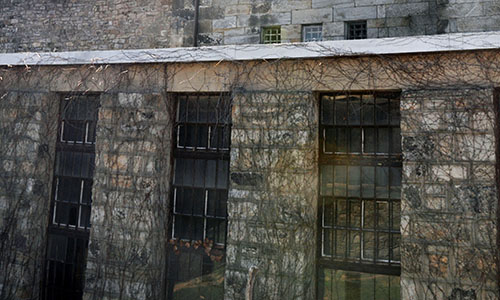Dr. Rita Shah’s one-person show, “Prison or Slave Castle?” examines the architecture of places of incarceration. The College’s assistant professor of sociology became interested in photography in the early 2000s. Her eye, she said, is drawn to architectural details, landscapes and the look and feel of spaces. And, as a criminologist, she questions how we think about corrections and correctional systems. By incorporating photography into that research, she said she aims to capture and better understand how correctional spaces fit within our societies.
The brochure that accompanies the yearlong photo exhibit at Elizabethtown College invites the visitor to guess if the images presented depict a prison or a slave castle. There are 18 check boxes to test accuracy.
The exhibit opens at 5 p.m. Thursday, Sept. 4, in the College’s Brossman Commons Conference Room 211 and continues, by appointment, throughout the academic year.
While places of confinement inhabit our daily lives, they often go unnoticed. Either they are hidden from view or are embedded into everyday life. In this exhibit, she explores two locations of confinement — Elmina Castle in Ghana and Eastern State Penitentiary in Philadelphia – both located in the heart of active communities.
Built 350 years apart, the locations are now historical museums. One held individuals viewed as property, while the other housed individuals viewed as redeemable. Arguably, the purposes are polar opposites. Yet, their look and feel are quite similar.
Elmina Castle (Elmina, Ghana) was constructed in 1482. Originally built as a trading outpost , it later become one of the most important sites of the Atlantic Slave Trade. Eastern State Penitentiary opened in 1829 and is considered the world’s first true penitentiary. Designed as a location of silent meditation as a means of reforming criminals, it was the inspiration for countless prisons around the world.
This exhibit unsettles this similarity and raises questions about architectural features across locations of imprisonment and how such structures have evolved (or not) over time to reflect societal ideas of confinement.
The exhibit, itself, is designed to resemble a place of imprisonment. The first set of photographs serves as the entrance gates to the facility while the remaining photographs are cell bars.
Numbered in a counterclockwise fashion, the exhibit asks you to decide: Is it a prison or a slave castle? Visitors take a guess, then find the answers in the pages of the exhibit brochure along with a description of each photograph. In addition, exhibit viewers may provide feedback through a short survey available at the exhibit.


